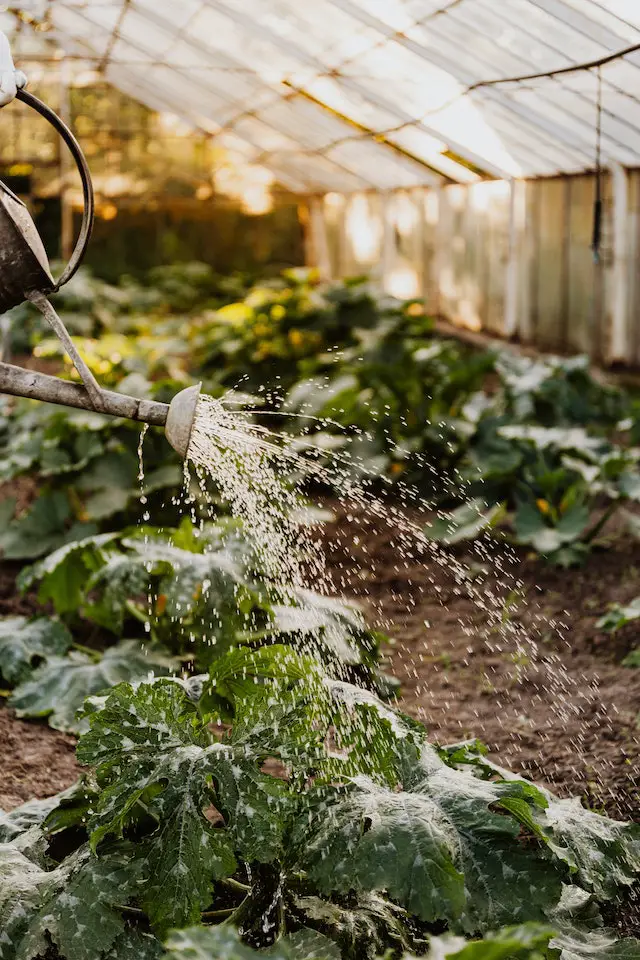Is sulfur water can be harmful to plants? It’s a common question among gardeners and those with an interest in plant care, and it’s important to get the facts. Sulfur is a naturally occurring mineral that can be found in water and soil, and while it may be beneficial for some plants, there are also potential risks associated with it.
In this blog post, we’ll explore the potential benefits and drawbacks of using sulfur water on plants, so you can make an informed decision about whether it’s right for your garden.
What is Sulfur Water?
Sulfur water is water that contains high levels of sulfur ions. It is produced by adding sulfuric acid to the water and is commonly used as a fertilizer for plants, particularly in areas with acidic soil.
The sulfur ions in the water help neutralize the soil’s pH, making it more hospitable for plant growth.
Sulfur water is also known as sulfate water, and it can be applied to the soil directly or added to irrigation systems.
It’s important to note that sulfur water should not be ingested by humans, as it can be dangerous and even fatal if consumed.
How does it affect plants?
Sulfur water has the potential to affect plants in both positive and negative ways.
On one hand, it can provide a range of essential nutrients to help boost plant growth, while on the other hand, the high concentration of sulfur can be harmful to sensitive species.
In general, sulfur water works by providing the soil with the necessary elements that are essential for healthy plant growth.
It can increase soil acidity, which makes it easier for plants to absorb significant minerals and trace elements like magnesium, calcium, nitrogen, and sulfur.
Additionally, sulfur water helps to reduce alkalinity, which can help make it easier for plants to absorb other essential nutrients like phosphorus and potassium.
At the same time, sulfur water can also cause damage to certain species of plants if it is used in too high of concentrations.
Some plants, such as tomatoes and peppers, can be especially sensitive to high levels of sulfur water, which can cause leaf yellowing and discoloration.
In order to avoid this type of damage, it is significant to monitor the concentration of sulfur water in the soil and adjust accordingly.
Are there any benefits to using it on plants?
Sulfur water can be beneficial to plants in certain circumstances.
It can help to reduce the amount of other fertilizers needed and can help increase soil nutrient availability. It can also help to reduce the pH of the soil, making it more acidic, which can benefit some plants that prefer a more acidic environment.
Sulfur water can also help to reduce the amount of disease and pest infestations, as well as reduce weeds.
In addition, sulfur water can help to break down nutrients such as nitrogen and phosphorus, making them more readily available to plants.
Finally, sulfur water can help to create a healthier and more balanced soil structure, allowing plants to grow and thrive better.
However, there are some potential downsides to using sulfur water on plants.
Too much sulfur can cause burning and yellowing of the leaves due to an excess of chlorine, as well as damaging any beneficial bacteria living in the soil.
Additionally, when using sulfur water for irrigation, one should make sure that the runoff does not reach any surface or ground waters, as this could lead to an over-concentration of sulfur-containing compounds.
To prevent these issues, make sure to follow instructions on any products containing sulfur carefully before use.
All in all, sulfur water can have both positive and negative impacts on your garden, so be sure to use it responsibly for the best results.
Are there any risks associated with using sulfur water on plants?
Using sulfur water on plants can be beneficial in some cases, however, it can also present risks. Too much sulfur can damage the soil and limit the growth of plants.
High levels of sulfur in the soil can lead to poor root development and poor nutrient absorption. It can also lead to a reduction in soil pH, which can cause a decrease in the number of beneficial microorganisms in the soil.
In addition, excessive sulfur application to plants can damage their foliage and stems. If the leaves are exposed to too much sulfur for too long, they will begin to turn yellow and die off. This can affect the overall health and vigor of the plant.
Therefore, it is important to understand how sulfur impacts your plants before applying it to them.
When using sulfur water, always follow the directions on the label carefully and never apply more than recommended. If you are unsure of how much to use, it is best to consult a professional.
So, is sulfur water not good for plants?
The answer to this question depends on the plant, the sulfur content of the water, and the amount of sulfur that is used.
Generally speaking, sulfur can be beneficial for some plants in small amounts, as it helps to stimulate root growth and reduce insect pests.
However, too much sulfur in the water can cause plants to suffer from nutrient deficiency, stunted growth, and yellowing of leaves.
It’s important to always research a plant before applying sulfur water and make sure you use it in moderation.
Additionally, sulfur-based fertilizers should never be used on vegetables or edible plants, as they are highly toxic.
If you do decide to use sulfur water on your plants, it’s best to start with very small amounts and observe their reaction over time.
Frequently asked questions (FAQs)
What is sulfur water?
Sulfur water is a mixture of hydrogen sulfide and oxygen. It is sometimes found in natural springs or wells, but it can also be made artificially.
Is sulfur water not good for plants?
That depends on the concentration of sulfur in the water. If the sulfur concentration is low, then the water will likely be safe for plants. However, if the sulfur content is too high, it can be damaging to plants.
What are the benefits of using sulfur water on plants?
When used correctly, sulfur water can help to improve the soil structure and increase nutrient availability. It can also help to improve plant growth and resistance to diseases and pests.
Are there any risks associated with using sulfur water on plants?
Yes, if the sulfur content of the water is too high, it can cause damage to the plants. In some cases, it can even kill them. Therefore, it is important to ensure that the sulfur content is not too high before applying it to your plants.
How do I know if the sulfur content of my water is safe for my plants?
You can purchase a test kit to measure the sulfur content of your water. Alternatively, you can have it tested by a professional.
Wrapping things up
So, is sulfur water bad for plants? Ultimately, the answer depends on the type of plant and the concentration of sulfur in the water. Generally speaking, low concentrations of sulfur water can be beneficial to many types of plants, as it helps to increase the plant’s natural defense mechanisms and promote healthy growth.
However, high concentrations of sulfur water can cause burning and damage to delicate plants and should be used sparingly or avoided altogether. Before using sulfur water on your plants, always research the specific requirements for each type of plant to ensure it receives the proper care.
Auto Amazon Links: No products found.
Perfect Plants Christmas Tree Saver 8oz. | Easy Use Xmas Tree Preserver Food | Have Healthy Green Christmas Trees All Holiday Season
$16.99 (as of February 3, 2026 23:18 GMT +00:00 - More info- Product prices and availability are accurate as of the date/time indicated and are subject to change. Any price and availability information displayed on [relevant Amazon Site(s), as applicable] at the time of purchase will apply to the purchase of this product.
VEVOR Tree Watering Bag Slow Release, 4 Pack 20 Gallons Tree Watering Bags/Ring, Reusable Refillable Tree Irrigation Ring Water Bags, Heavy Duty Watering System for Shrub Tree Root Drip Irrigation
$38.90 (as of February 3, 2026 23:18 GMT +00:00 - More info- Product prices and availability are accurate as of the date/time indicated and are subject to change. Any price and availability information displayed on [relevant Amazon Site(s), as applicable] at the time of purchase will apply to the purchase of this product.
Wilt-Pruf® Christmas Tree/Cutting Preserver Spray |Preserves Christmas Trees, Wreaths, Garlands, Cuttings and Carved Pumpkins | Reduces Needle Drop | Keeps Cut Trees Fresh Longer | Natural (32 oz)
$21.99 (as of February 3, 2026 23:18 GMT +00:00 - More info- Product prices and availability are accurate as of the date/time indicated and are subject to change. Any price and availability information displayed on [relevant Amazon Site(s), as applicable] at the time of purchase will apply to the purchase of this product.
Rocky Mountain Goods Christmas Tree Food - 8 oz Tree Preservative - Reduce Needle Drop - Greener Scent - Fir, Pine, Spruce Trees - Extend Tree Life
$9.95 (as of February 3, 2026 23:18 GMT +00:00 - More info- Product prices and availability are accurate as of the date/time indicated and are subject to change. Any price and availability information displayed on [relevant Amazon Site(s), as applicable] at the time of purchase will apply to the purchase of this product.
2 Pack Tree Watering Bags, 20 Gallon Reusable Heavy Duty Slow Release Water Bags for Trees, Durable PE Tree Drip Irrigation Bags with Heavy Duty Zipper, Deep Root Targeting
$14.99 (as of February 3, 2026 23:18 GMT +00:00 - More info- Product prices and availability are accurate as of the date/time indicated and are subject to change. Any price and availability information displayed on [relevant Amazon Site(s), as applicable] at the time of purchase will apply to the purchase of this product.
Wagner's 53002 Farmer's Delight Wild Bird Food with Cherry Flavor, 10-Pound Bag
$12.48 (as of February 3, 2026 16:25 GMT +00:00 - More info- Product prices and availability are accurate as of the date/time indicated and are subject to change. Any price and availability information displayed on [relevant Amazon Site(s), as applicable] at the time of purchase will apply to the purchase of this product.
OLANLY Dog Door Mat for Muddy Paws 30x20, Absorbs Moisture and Dirt, Absorbent Non-Slip Washable Doormat, Quick Dry Chenille Mud Mat for Dogs, Entry Indoor Entryway Carpet for Inside Floor, Grey
$9.49 (as of February 3, 2026 16:25 GMT +00:00 - More info- Product prices and availability are accurate as of the date/time indicated and are subject to change. Any price and availability information displayed on [relevant Amazon Site(s), as applicable] at the time of purchase will apply to the purchase of this product.
TERRO Ant Killer Bait Stations T300B - Liquid Bait to Eliminate Ants - Bait System - 12 Count Stations for Effective Indoor Ant Control
$11.97 (as of February 3, 2026 16:25 GMT +00:00 - More info- Product prices and availability are accurate as of the date/time indicated and are subject to change. Any price and availability information displayed on [relevant Amazon Site(s), as applicable] at the time of purchase will apply to the purchase of this product.
Trade Grade Pet-Friendly Ice Melt - Fast Acting Magnesium Chloride Formula, Safer for Pets & Surfaces, 15lb Bucket
$45.98 (as of February 3, 2026 16:25 GMT +00:00 - More info- Product prices and availability are accurate as of the date/time indicated and are subject to change. Any price and availability information displayed on [relevant Amazon Site(s), as applicable] at the time of purchase will apply to the purchase of this product.
TempPro TP50 Digital Hygrometer Indoor Thermometer Room Thermometer and Humidity Gauge with Temperature Humidity Monitor(Previously ThermoPro)
$10.99 (as of February 3, 2026 16:25 GMT +00:00 - More info- Product prices and availability are accurate as of the date/time indicated and are subject to change. Any price and availability information displayed on [relevant Amazon Site(s), as applicable] at the time of purchase will apply to the purchase of this product.












